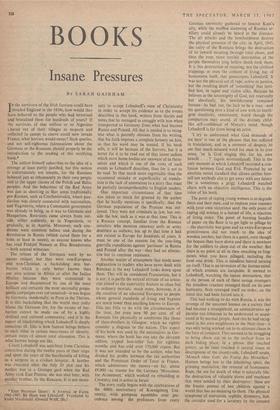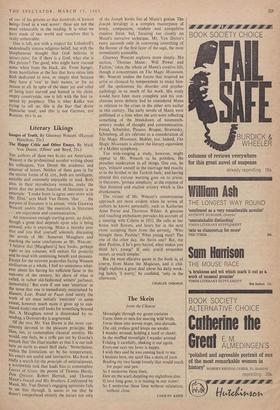BOOKS
Insane Pressures
BY SARAH GAINHAM 'invaded the survivors of the Irish famines could have 'invaded England in the 1850s, how would they have behaved to the people who had terrorised and brutalised them for hundreds of years? If the survivors of that million or so Algerians cleared out of their villages as suspects and collected in camps to starve could now invade France, what horrors would ensue? Such queries, and not self-righteous fulminations about the Germans or the Russians, should properly be the introduction to the reading of this terrifying book.*
The author himself subscribes to the idea of a revenge at least partly justified, but this notion is unfortunately not tenable, for the Russians behaved just as inhumanely to their own people and to the upper classes of the Polish and Baltic peoples. And the behaviour of the Red Army was just as shocking in Slav areas traditionally pro-Russian, such as Czechoslovakia, where pan- slavism was closely connected with nationalism, and Yugoslavia, where a Communist government was already in being, as it was to Germans and Hungarians. Restraints came always from out- side, either suddenly, as in Yugoslavia, or gradually, as in Austria. Moreover, such con- ditions were common before and during the Revolution in Russia (which cured them for a time, at least in intent), as anyone knows who has read Fridtjof Nansen or Elsa Brandstroem —both neutral witnesses.
The crimes of the Germans were by no means unique; but they were non-European and non-Christian, a backsliding into bar- barism which is only better known than our own actions in Africa or after the Indian Mutiny because they were committed in Europe and documented by one of the most brilliant and certainly the most successful propa- ganda campaigns ever yet mounted—it was begun by Germans, incidentally, in Paris in the Thirties. It is this backsliding that the world may justly blame the Germans for, for the excuse of bar- barism cannot be made use of by a highly civilised and cultured community; and it is the aspect of blacksliding which Lehndorff is deeply conscious of. This is how human beings behave to each other in certain mass-losses of identity, certain states of almost total alienation. This is what human beings are like.
Count Lehndorff was anti-Nazi from Christian conviction during the twelve years of their reign and spent the years of the bacchanalia of killing as a surgeon in a civilian hospital. A brother was executed after the July 20 plot and his mother was in a Gestapo gaol when the Red Army took East Prussia; she was shot later, with another brother, by the Russians. It is not neces-
* EAST PRUSSIAN DIARY: A JOURNAL OF FAITH, 1945-1947. By Hans von Lehndorff. Translated by Violet Macdonald. (Oswald Wolff, 28s.)
sary to accept Lehndorff's view of Christianity in order to accept his evidence as to the events described in this book, written from diaries and notes that he managed to smuggle with him when transported to Germany from what had become Russia and Poland. All that is needed is to recog- nise what is patently obvious from his writing, that his faith imposes a complete honesty on him, so that his word may be trusted. If his book sells, it will be because of the horrors; but it is better for it to be read out of that latent sadism which most home-bodies are unaware of in them- selves and which is one of the roots of such events as Lehndorff describes, than for it not to be read. So that much more regrettable than the occasional mistake or superficiality of transla- tion is the lack of annotation to a story that must be partially incomprehensible to English readers.
One important circumstance of that time was taken so much for granted by the author that he hardly mentions it specifically; that the German population of the Prussias was out- lawed. They were not criminals in law, but out- side the law, such as it was at that time. This is a Russian concept, familiar from the Russian novelists who mention runaway serfs or army deserters as outlaws; but up to that time it had not existed in Europe for hundreds of years. It must be one of the reasons for the year-long guerrilla expeditions against 'partisans' in Russia and Poland after the war—they had no alterna- tive but to continue resistance.
Another matter of atmosphere that needs some explanation to readers who have never dealt with Russians is the way Lehndorff looks down upon them. This will be considered Prussianism, but it is not; it is partly the natural attitude of an aristo- crat joined to the superiority doctors so often feel to ordinary mortals; much more, however, it is the reaction of an educated European to people whose general standards of living and hygiene are much lower than anything known in Europe. This has little to do with the circumstances of the time, for even now 90 per cent. of all Russians live physically in conditions like those of slum-dwellers in Glasgow, which we rightly consider a disgrace to the nation. This aspect of his book was used by the nationalists in Ger- many, where the book has run into the eleventh edition, topped best-seller lists for eighteen months and has sold over 170,000 copies. But it was not intended so by the author, who has divided his profits between the tax authorities and the Protestant Order of Tesz6 in France, which administers the money—so far, about £9,000—as trustee for the German 'Movement for Atonement,' which worked on rebuilding at Coventry and is active in Israel.
The story really begins with the celebrations of the 400th anniversary of Koenigsberg Uni- versity, with pompous squabbles over pre- cedence among the professors from every German university gathered to honour Kant's city, while the muffled slamming of Russian ar- tillery could already be heard in the distance.
The air attacks and the bombardment destroy the physical presence of the city; in April, 1945, the entry of the Russians brings the destruction of its inward meaning through total chaos, and then the even more terrible destruction of the people themselves long before death took them. It is this destruction of meaning, not the civilised trappings or even the content of living, but of humanness itself, that preoccupies Lehndorff. It was not the physical act of rape, active or passive, but the resulting death of 'something' that terri- fied him, in rapist and victim alike. Because he believes in the sovereignty of God, not reservedly but absolutely, his bewilderment remained human—he had, too, the luck to be a man—and his questioning stirs a kind of awe with its intelli- gent simplicity, reminiscent, weird though the comparison may sound, of the divinely child- like self-confidence of Mozart's mind, though Lehndorff is far from being an artist.
`I try to understand what God demands of me here' is one of the phrases that has suffered in translation; and in a moment of despair, to use that much misused word for once in its true sense, 'or is God staging this • for his own benefit . . . ?' (again mistranslated). This is the only moment at which Lehndorff recorded a con- fusion between God and Evil. Protected by an absolute moral standard that allows neither him- self nor anybody else to get away with any falsity (he is sometimes a prig), Lehndorff watched chaos with an objective intelligence. This is the value of his book.
The point of raping young women is to degrade them and their men, and to implant your enemies with your own victorious seed; the only point of raping old women is a hatred of life, a rejection of living order. The point of burning bundles of paper on the floor is to get light to pillage by —the electricity was gone and an extra-European primitiveness did not reach to the idea of wooden torches; but there is a point, even though the houses then burn down and there is nowhere for the soldiers to sleep out of the weather. But there is no point at all in then smashing to frag- ments what you have pillaged, including the food and drink. This is mindless hatred turning on itself. That is an inversion of the human mind, of which animals are incapable. It seemed to Lehndorff, watching the insane destruction, that in the person of each of these savage revengers the mindless creature revenged itself on its own humanity, flesh revenged itself on order, on the mind that had been forced into it.
This had nothing to do with Russia, it was the revenge of the untamed human on a society that had become a stranglehold, an administrative ap- paratus too inhuman to be understood or acqui- esced in by normal people. And this he had recog- nised in his own neighbours in the Nazi time—it was only being worked out to its ultimate chaos in the fury of conquest. They seemed to be struggling to bring chaos out on to the surface from its dark hiding place; in a phrase that touched poetry, as he later touched it several times in descriptions of the countryside, Lehndorff wrote, `Mensch ohne Gott, die Fratze des Menschen.' Human beings lost to the inhabiting spirit, the grinning mutilation, the reversal of humanness. Rape, the use for death of what is naturally life; the destruction of valuable stores and machines that were needed by their destroyers:- these are the frantic protest of lost children against a world that has no meaning to them. The physical symptoms of starvation, syphilis, dysentery, lice, the corridor used for a lavatory by the inmates of one of his prisons so that hundreds of human beings lived in a vast sewer : these are not the most unbearable in the reading. It is what we have made of our world and ourselves that is really unbearable.
One is left, not with a respect for Lehndorff's undoubtedly sincere religious belief, but with the blasphemous thought that God believes in laissez-faire; for if there is a God, what else is this picture? The good, who might have rescued some white from the black, die. From hunger, from humiliation at the lice that have eaten into flesh dedicated to love, or simply shot because they have a 'von' to their names, or for no reason at all. In spite of the sheer joy and relief of being later starved and hunted in the clean, empty countryside, one is left with the fear in- spired by prophecy. This is what Kafka was trying to tell us; this is the fear that drove Nietzsche mad; and this is not German, not Russian, this is us.



































 Previous page
Previous page